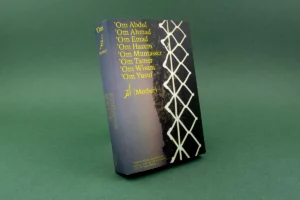YOUR CART
- No products in the cart.
Subtotal:
€ 0

Photography:
’Om Abdul
’Om Ahmad
’Om Emad
’Om Hazem
’Om Muntasser
’Om Tamer
’Om Wisam
’Om Yusuf
and their families
Barbara Debeuckelaere
Text:
Barbara Debeuckelaere
Adam Broomberg
Edit:
Barbara Debeuckelaere
Carel Fransen
Design and cartography:
Carel Fransen
Print:
Albe de Coker (BE)
Binding:
Sepeli (BE)
Mother, I will not name you a woman,
I will name you everything.
– Mahmoud Darwish
’Om (Mother) is a collaborative photography project by Barbara Debeuckelaere (BE) and all the women of eight families from Tel Rumeida in Hebron, Palestine. Apart from Jerusalem, Hebron is the only place in the West Bank where radical Israeli settlers live in the heart of a Palestinian city, and is home to several sites sacred to both Jews and Arabs. The entanglement of small and heavily guarded settlements cuts up historic neighbourhoods into small sectors with checkpoints, severely restricting the freedom of movement of Palestinian residents. Since only two per cent of the Old City’s population is Israeli, protected by more than twice as many soldiers, tensions in this split society regularly escalate.
Apart from the lingering conflict and illegal occupation, Palestinians are under constant surveillance and face the immediate threat of their colonist neighbours violently harassing them, which they do with impunity. Although both men and women suffer from this situation, women are rarely heard or seen, as they mostly stay at home, fearing for their own and their childrens’ safety. Therefore, news reports items on the conflict usually see Palestinian men fighting back or suffering violence.
In ’Om (Mother), the Palestinian women of Tel Rumeida claim agency by handling the camera themselves to document their lives, their homes, and their immediate surroundings. The camera is used to show their perseverance and expose the ambiguity of home. By showing the world their determination to continue their daily lives under occupation, these women are participating in the ultimate act of resistance.
With an essay by Adam Broomberg.
Barbara Debeuckelaere’s visual work revolves around normalisation, capitalism, money and power and lies at the intersection of documentary and fiction, of still and moving image, of seriousness and play. It depicts real spaces with an unexpected role for emotions, poetry and unconscious drives. Debeuckelaere was previously a development worker in Suriname and a radio and TV journalist for Belgian broadcaster VRT. In 2015, she left journalism to study visual arts and work on her own projects, mainly through photography and film. She has a master’s degree in economics, in international politics, and in photography. Her work has been published in newspapers (De Standaard, Volkskrant) and exhibited (FOMU, Brakke Grond, Rivoli Brussels).